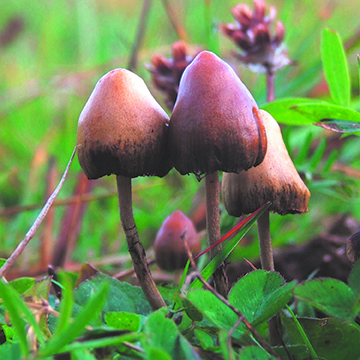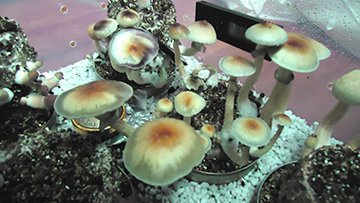“Every now and then a man’s mind is stretched by a new idea or sensation, and never shrinks back to its former dimensions.”
- Oliver Wendell Holmes
by Luke Schmaltz

On May 14, 2019 Denver’s profile as a one-of-a-kind American city expanded in dimension. Initiative 301 passed by the slimmest of margins (50.6% to 49.4%) which enacted the decriminalization of psilocybin — the active substance in psychedelic mushrooms.
Those who are curious as to what may happen next can refer to the cannabis legalization history book and take note of a few crucial milestones. Firstly, psilocybin is not yet legal, it has simply been demoted to “the lowest legal priority” according to Decriminalize Denver, the grassroots political action group that introduced the measure. This important step toward legalization means that, at some point in the future, anyone over 21 will be able to legally purchase psilocybin mushroom products and services in a retail or clinical setting. Currently the City of Denver’s policy is to devote zero resources to the prosecution of psilocybin with a review panel in place which will intermittently assess public and fiscal impacts of the measure.
Just as the monetization of marijuana continues to prove, when a controlled substance with numerous benefits becomes legal, innovation and entrepreneurship flourish. In the case of psilocybin, however, consumption on a massive scale as in the cannabis industry is tentative, due to the distinct differences between the psilocybin and THC. The greatest of these being that magic mushrooms do not have the same widespread appeal as marijuana. Regardless, impending legalization harkens the creation of a new segment of commerce that will, for a while at least, be unique to the Mile High City.
An Element Of Familiarity
Like the marijuana flower, “magic” mushrooms occur naturally across the world in dozens of strains with varying potencies. Once mature, the dried caps and stems can be consumed raw or added to food and beverages for greater palatability. Also, psilocybin holds great allure for recreational substance users while presenting untold value for the medical and wellness fields.
A New Retail Market
Palatability has long been an issue with psychedelic mushrooms, as most who have partaken attest that chewing the dried fungi is less than pleasant. So, it stands to reason that the first retail products will address this objection — most likely with the same creative gusto seen in the cannabis industry. One can expect chocolate bars infused with “shake” — a term for ground-up mushroom caps and stems. Other anticipations could also include gelatin capsules, peanut butter (creamy or crunchy), green tea bags, jars of honey, pasta sauces, and smoothie-ready fruit medleys — all infused with specific doses per serving of psilocybin. Although tax revenue on these gross sales may pale in comparison to the cannabis numbers, there’s no doubt that this new market will produce jobs and stimulate commerce.
Guided “Trip” Tourism
Once psilocybin can be legally sold and openly consumed, all-inclusive magic mushroom experiences may further expand Colorado’s tourism appeal. These “trip” packages would most likely include measured doses in the preferred method of ingestion, a controlled environment based on the clients’ personal tastes and a shaman-type guide to administer the proper amounts and lead the weekend adventurers through each phase of their journey. These psychedelic retreats could be marketed as self-care vacations and consciousness-expanding getaways.
Alternative Treatment Clinics

The prescription opioid crisis has proven that assigning a pill to every affliction may not be the best long-term strategy. In a search for non-addictive compounds for treating difficult maladies, science and medicine have discovered some compelling therapeutic aspects of psilocybin. Studies by the Heffter Research Institute, Multidisciplinary Association for Psychedelic Studies (MAPS) and the Beckley Foundation have proven the efficacy of psilocybin in treating depression, addiction, obsessive-compulsive disorder, cluster headaches, anxiety and PTSD among other conditions. Upon legalization, health and wellness professionals may be setting up psilocybin therapy practices that treat the root of health problems instead of masking the symptoms.
Peace Of Mind Services
Aside from recreational allure and therapeutic potency, perhaps the greatest benefit magic mushrooms have to offer is inner peace. A 2016 FDA-approved clinical trial called the NYU Psilocybin Cancer Anxiety Project revealed that psilocybin had a profoundly positive effect on those struggling with end-of-life issues. Specifically, through measured, guided doses, cancer patients experiencing depression and anxiety in the face of impending death were able to confront their fears and find peace of mind. This profoundly valuable service will no doubt find a robust clientele when psilocybin becomes legal. Palliative care clinics designed to help patients enjoy their final days with clarity and mental tranquility may carve out a significant market share. Rather than being a sad and somber last chapter of life, hospice may present a final opportunity for the dying to celebrate the beauty of life.
Psilocybin has not been decriminalized in America since the 1970s, which puts Denver at the forefront of territory that has been unexplored for the last 50 years or so. With legalization a distinct possibility, so too are the possibilities for new segments of commerce forged by highly valued products and services.
